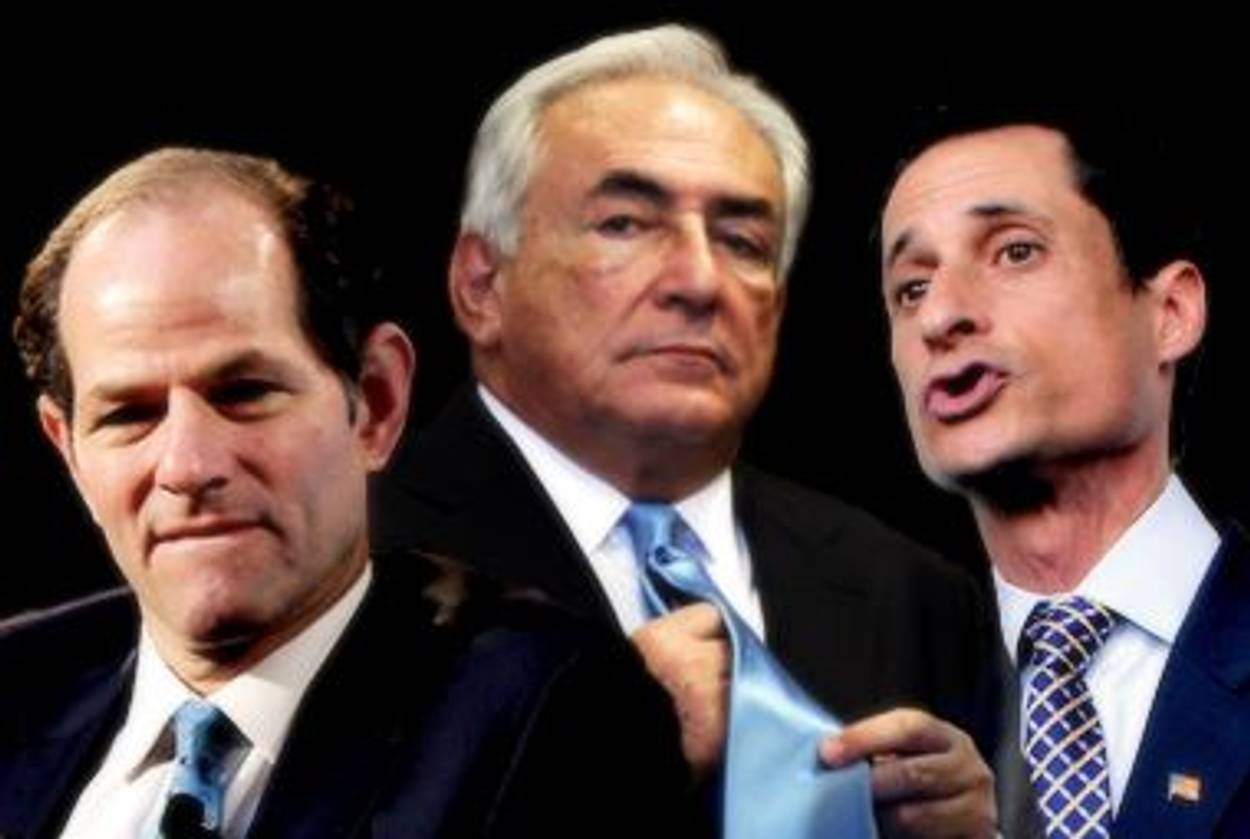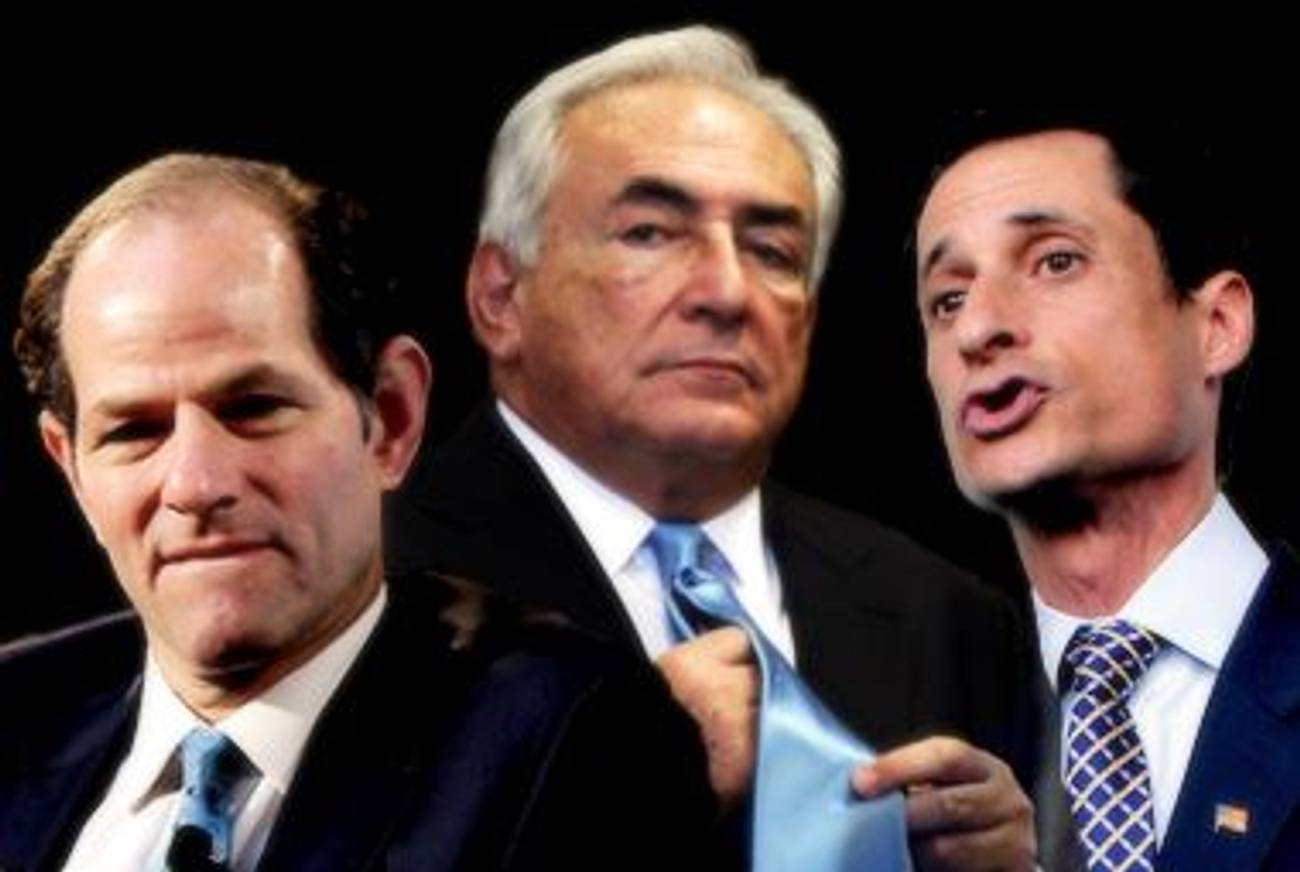Big Men
Anthony Weiner, Eliot Spitzer, and Dominique Strauss-Kahn are all a certain type: the Jewish Big, narcissistic, entitled, and unapologetic. And society loves to see a Jewish Big fall.




During the Anthony Weiner dirty-tweeting scandal, no one had much to say about the Jewish congressman’s religion. The same was true of New York Gov. Eliot Spitzer, also Jewish, when he was revealed to be frequenting prostitutes, and IMF chief Dominique Strauss-Kahn, who’s half-Jewish and half-Catholic, when he was pulled off an airplane and charged with rape. This is odd because it was their faith—their Jewishness—that was responsible, in a way, for their undoing.
Weiner, Spitzer, and Strauss-Kahn are all representative of a certain type of Jewish man: what former Forward editor Seth Lipsky used to call, half-ironically, “Jewish Bigs.” Jewish Bigs are emperors without any clothes—men who believe they are important because someone else, starting around age zero, told them they were. What they are not are the people they believe themselves to be—bold, fearless, supremely intelligent, always, always in the right. It should be stressed, very high up, that this is a small subset of the Jewish community, and that this subset is probably not entirely distinct from other noxious, embarrassing, offensive, or ethically lacking subsets of other communities, religious and otherwise. But all this doesn’t make the phenomenon any less real or less troubling.
There’s more: The Jewish Big is a particularly prominent subset in today’s America. There may be clearly defined subsets of Latvian Bigs or Latino Bigs or even Zoroastrian Bigs, but none of these communities-within-communities has consumed as much airtime as the Jewish Big. Nor are any of these parallel bigs big because of their respective national, religious, or ethnic identities; they just happen to be big and, say, Latvian. Nor are any of them especially susceptible to the sensibilities of elite society, in which a hyper-sensitive and ineffectual feminism is married to a mindless Puritanism. It is the Jewish Big who is uniquely big and vulnerable to a non-Jewish world that doesn’t care for him—not simply because he’s big but because he’s big and Jewish.
The Jewish Big has not always been and will not always be. He is a function of a postwar Jewish culture that is only a few generations from the shtetl. He is the vessel into which the heavily caricatured Jewish mother funnels all her ambitions and anxieties. Usually, happily, these vessels grow up. They transcend their childhood. They become someone. But the sort who ends up as a Jewish Big is unable to transcend, as if by congenital fiat. He believes that all the wonderful things his mother told him about him are true; he never learns that almost all these things are lies or distortions that, ideally, serve to strengthen the undeveloped ego of a 5-year-old who, once grown, will achieve just a few of the things his mother told him he would. He is narcissistic and blind because he doesn’t know that he is not, as it turns out, the Messiah. What he is is a groyser tsuleyger, or big shot, with the crudeness of a bulvan, or dummy—although he knows enough to smooth over those edges when need be, to contain his many angers. He reminds us, just a bit, of Philip Roth’s father figure in Goodbye, Columbus, Ben Patimkin. But he’s nastier. Patimkin dotes on his daughter. The Jewish Big doesn’t know how to dote. Yes, he has his moments, his flashes of gratuitous warmth, but these are moments, exceptions to his personality, which is narrow and single-minded: The Jewish Big only knows how to love himself. The love he doles out to other people is part of the happy diorama he has cobbled together in the service of his success. It is contrived.
What makes the Jewish Big particularly offensive is that he was not supposed to be this way. This is not the place he comes from. Jewish civilization, it bears repeating, is a rich tapestry. That tapestry doesn’t stand apart. It is a majestic force that is very much of this world and is meant to make us more humane, wise, understanding—civilized. But the Jewish Big is less civilized. He has never gazed at one of Chagall’s floating brides or read one of Babel’s Odessa stories. He has forgotten that the synagogue is led by a teacher, whose job it is to force upon us a great, if not always welcome, introspection. This is the etiology of the Jew, and especially the Ashkenazi Jew, but it is as if the Jewish Big has been divorced from his beginnings. Where has he been, this bully, this chump, with his smirk and his sense of entitlement? Has he not been paying attention? Where is the warmth, the ironic wit, the inclination to think and argue and wonder and parse, to tread with care and a modicum of intelligence? The Jewish Big doesn’t know from this.
In Weiner, Spitzer, and Strauss-Kahn can be found all the essential ingredients of this outlier personality. It’s not simply arrogance and brazenness. (Certainly, Bill Clinton is arrogant, as are David Vitter, John Ensign, and John Edwards, and few, if any, politicians have outflanked the Kennedys in raw brazenness.) It’s the arrogance and brazenness coupled with a glaring meanness. (We see manifestations of this unhappy cocktail in other Jewish Bigs whose crimes are not sexual, starting with Bernie Madoff and Jack Abramoff.) This is why it’s so hard for the Jewish Big to apologize for his transgressions—and it’s why the public finds it impossible to accept his apology. He doesn’t believe he’s done anything wrong, and, much more important, he is offended, deeply and personally, by the suggestion that he has. When attacked, his inclination is to explode. Instead of apologizing, he snarls. When he does apologize, he doesn’t mean it, and we know it, and he knows we know it, and this compounds his rage. He is trapped in a vise that is alternately infuriating and mystifying. He does not believe, reasonably enough, that a Messiah can do any wrong. We’d rather not see things this way. It would be much simpler—it would comport with present-day practice—to view the Jewish Big as just another white male oppressing people of color, and, in fact, Strauss-Kahn’s African-born chambermaid and Weiner’s Twitter correspondents, including an African-American woman in Seattle, reaffirm this dichotomy in the public mind. But that would be a mistake. That would be an easy explanation that fits neatly into a liberal theology that views the world through a simple-minded prism of equal parts race, class, and gender.
The unfairness of it all is that the Jewish Big is, in fact, programmed to be “bad” more often than non-Jewish, and especially Gentile, Bigs. That’s because he was born into a people that has no culture of sin. This doesn’t mean he or any other Jews are unfamiliar with the idea of sin. We know all about sin. We just don’t believe that we’re born bad. We have no original sin. This seems absurd and cruel, and it makes people scared of their bodies: What will I do if left to my own devices? (It’s not an accident that it was a Viennese Jew who made the breakthrough observation that sex is an utterly ordinary and central part of the human experience.) So, the Jewish Big believes he has a license that, in fact, he does not have, that no one has. In his narcissism, he confuses an absence of sin culture and an absence of sin. He thinks that because no one ever said that sex is evil, and because everyone always said that he was wonderful and perfect, he can have what he wants. He intuits that that’s not always possible—getting ahead demands that he hew to certain standards—but he doesn’t really feel it. He doesn’t believe it. He is, you might say, less restrained.
Until recently, this lack of restraint was less problematic. That was when America was more forgiving of sexual improprieties and we didn’t learn about them via hand-held device, if at all. Now the Jewish Big’s many crimes and misdemeanors, literal and figurative, are not just unacceptable; they are broadcast everywhere instantly. The dalliance, the hotel tangle, the pathetic display of whatever it was that Weiner was up to—all these things are violations of the spirit of our time, and they cannot be so easily covered up. Even if one’s crimes have not been recorded digitally, as in the cases of Spitzer and Strauss-Kahn, the conversation about those crimes takes place in a digital arena that metastasizes like a communicable disease across multiple latitudes and time zones with a hitherto unknown velocity. The only kind of offender who can escape this sand trap is someone who already enjoys a great well of public affection.
This raises an important and related point: The Jewish Big does not enjoy a great well of public affection. This is due, mostly, to his character, which is lacking. But there’s something else: The fall of the Jewish Big is not entirely his own making. That’s because the Jewish Big is Jewish, and the Christian, non-Jewish public likes Jewish when it’s humorous, charming, wise—Talmudic. But when it’s not those things, when a Jew acts badly, the public is reminded, consciously or otherwise, of the Jew’s otherness, of all the medieval fairy tales that have been swirling through the ether for centuries, about Shylocks and perverts and cheats and spineless men and big-hipped women and bankers and communists and government-occupying Zionists, and that is when a preliminary annoyance or distraction morphs into something uglier.
When Weiner announced that he was resigning from Congress, at a press conference in Brooklyn, he was greeted with an angry round of applause and shouts of “pervert!” There was a ferociousness in that response that was deeply disproportionate. Weiner broke no laws and hadn’t even behaved that badly. His crime: acting crudely and lying about it. How strange that so many people should be so offended by his wrongdoing. Yet they were, because the Jewish Big is not just big but because he’s other. He is suggestive of an anti-Semitic cartoon. He isn’t that cartoon, of course. But he makes other people think that he might be. He reminds them that he is not from this place, even if he is.
Peter Savodnik is the author of The Interloper: Lee Harvey Oswald Inside the Soviet Union. He writes for Vanity Fair, among other publications. He can be found on Twitter @petersavodnik.